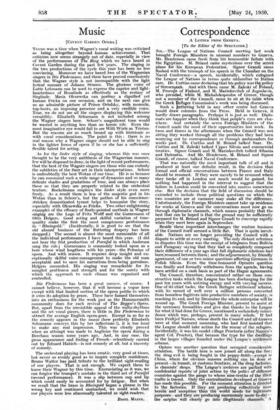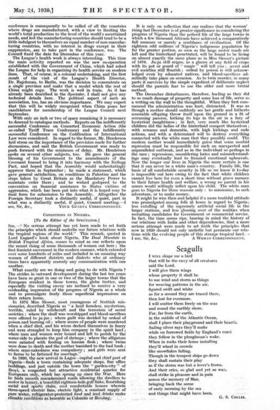Correspondence
A LETTER FROM GENEVA. [To the Editor of the SPECTATOR.] SIR,—The League of Nations Council meeting last week brought Foreign Ministers in unusual numbers to Geneva.
Mr. Henderson came fresh frond' his honourable failure with
the Egyptians. M. Briand came mysterious over the secret plans for -his- European Federation. Signor Grandi came
flushed with 'the triumph of his speech in the Chamber on the Naval Conference—a speech, incidentally, which eulogized the League of 'Nations in terms quite unfamiliar to Italian
ears. Dr. Curtius came declaring that his policy was the policy of Stresenyinti. And with them. came M. Zaleski of Poland4 M. Procoide of Finland, and M. Marinkovitch of Jugoslavia, who presided, *bile M. Michalokopoulos of Greece, though not a Member -of the Council, came to sit at its table when the Greek Refugee Commission's work was being discussed. Such -a gathering -held in any other centre but. Geneva would draw columns from the Press. Held in Geneva, it hardly draws paragraphs. Perhaps it is just as well: Diplo- Mats are happier when they think that people's eyes are else- Where. 'And certainly the seven Foreign Ministers -of the Council made the most of their opportunities last week. In twos and threeS in the afterniions when the Councir was not sitting they worked through all the problems they had been worrying out by correspondence or through ambassadors for weeks past. Dr. Curtius and M: Briand talked Saar. Dr. CurtiuS and M. Zaleski talked Upper Silesia and commercial -treaties. Signor Grandi and M. Marinkovitch talked Albania and Dalmatia. -And Mr. Henderson, M. Briand and Signor Grandi, of course, talked Naval Conference. That was naturally the most important talk of all and it produced at least one definite result, in the decision that 'formal and official conversations between France and 'Italy Should be resumed. If they were merely to be resumed where they broke off in London not much would be gained, for nothing had happened in the interval to suggest that the failure in London could be converted into success somewhere else. But the decision that the field of discussion should be extended to include those political questions on' which the two- countries are at variance' may make all the difference. Unfortunately, the Foreign Ministers cannot take up residence for weeks at Geneva and the conversations must now go on through diplomatic channels, which means probably that the best that can be hoped is that the ground may be sufficiently prepared for M. Briand and Signor Grandi to converge rapidly when they meet here again in September.
. Beside these important interchanges the routine business of the Council itself seemed a little flat. That is quite inevit- able. Nations are no longer providing the Council with a dispute to settle at every meeting. The only distant reference to disputes this time was the receipt of telegrams from BoliVia and Paraguay saying that they had so completely composed their difference of a year ago that full diplomatic relations had
been between them ; and the adjournment, by friendly agreement, of one or two minor questions affecting Germans in Polish Silesia. Even the time-honoured Optants queition was finally and formally withdrawn from the agenda, having been settled on a cash basis as part of the Hague agreements The Council, therefore, concentrated rather on those con- structive tasks which the League has been discharging for the past ten years with untiring energy and with varying ,snecess. One of its chief tasks, the Greek Refugee settlement 'scheme, with its record of well over a million persons ' converted frond homeless fugitives into produetiVe members of society, is reaching its end, and by December the whole enterprise will be wound up. The Greek Foreign Minister, present to assist at the necessary fornialities and give due thanks 'to the League Tor what it had donefOr Greece, mentioned a melancholy Comei- denee which was, perhaps, present in many riifnds. It had 'been Fridtjof NanSen, whose death the COuncil aiurall Geneva were at that moment mourning, who had first insisted that the League should take action for the rescue of the refugees. Incidentally, it was his model village Proctoria (after Nansen's agent Col. PrOctor), that beeitnrie the' type for the- dwellings in the larger villages founded under the -League's s'ettleirient scheme.
Opium was another question that occupied' Considerable attention. The battle_ here 'is now joined all along the line; the drug evil is being fought in the poppy-fields7--except in China, where for obvious reasons nothing can be done at present—in transit, at customs frontiers, at theditig_fattOries, in cheriiisti' shops.' The League's'archives are 'paCked with confidential reports' of joint action by the pollee. of different countries against the gangs to whom nine-tenths of the 'illicit traffic is traced. Only the centralization developed at Geneva has made this possible. FOr the moment attention is directed to the factories. If they' are producing collectively more heroin- and -Morphine than the world needs for legitimate ptirpoSes--and'they are prOducing enormously more to-day the surplus- will clearly -go into illegitimate channels. -"
conference is consequently to be called of all the countries where drugs are manufactured, with a view to limiting the world's total production to the level of the world's ascertained needs, and lest the manufacturing countries should tend to be a little indulgent to themselves an equal number of non-manufac- turing countries, with no interest in drugs except in their suppression, „are. to take part in the conference, too. The ,Council fixed the date for -December of this year. The League's health work is always interesting. This time the main activity reported on was the new cooperation established with the Government of China, which had, asked the League for help in organizing its health service on modern lines. That, of course, is a colossal undertaking, and the first ,result of the visit of the League's Health Director, Dr. Rajchman, to Berlin, was the decision to concentrate on a single province and make that a model which the rest of China might copy. The work is well in train. As it has already been described in the Spectator, I shall not give any technical details here. - The political . aspect of such- an association, too, has an obvious importance. We may expect that this will be widely recognized when China poses her candidature for membership of the League Council next September.
With only an inch or two of space remaining it is necessary to descend to catalogue methods. Reports on the indifferently successful Conference on Concerted Economic Action (the so-called Tariff •Truce Conference) and the indifferently successful Conference on the Codification of International Law were considered. In regard to the former, Mr. Henderson laid stress on the importance of the provision made for further discussions, and said the British Government was ready to push forward with the minimum of delay. . Mr. Henderson spoke on several _other subjects, too. He gave the general blessing of his Government to the amendments of the Covenant framed to bring it into harmony with the Kellogg Pact, and hoped that the Assembly would unhesitatingly approve them in September ; -he made a statement, which gave general satisfaction, on conditions in Palestine and the steps taken by . Great Britain as the Mandatory Power to maintain order there ; and he wished godspeed to the convention on financial assistance to States victims of aggression, which has been put into what it is hoped may be final form for submission to the Assembly.. Altogether the Foreign Secretary took a distinctly useful, if quiet, part in .what was a distinctly useful, if quiet, -Council meeting.—I am, Sir, &c., YOUR GENEVA CORRESPONDENT.







































 Previous page
Previous page